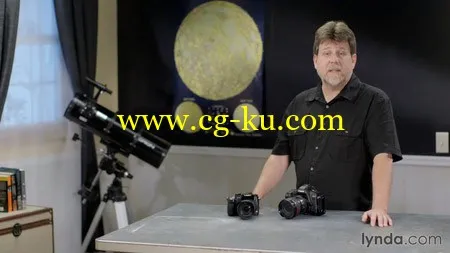
Photographing and Assembling a Lunar Eclipse Composite (2015)
WEBRip | English | MP4 | 1280 x 720 | AVC ~502 kbps | 15 fps
AAC | 128 Kbps | 44.1 KHz | 1 channel | 02:43:53 | 928.1 MB
Genre: Video Tutorial / Photographing
A lunar eclipse is a relatively common astronomical event that always brings out the cameras and the long telephoto lenses. But the next time a lunar eclipse comes around, go beyond just taking a close-up of a darkened moon. Create a composite that shows the phases of the eclipse—and better still, shows the composite in the context of the landscape underneath it.
That's what photographer and educator Seán Duggan did, and in this course, he deconstructs his photographic steps and post-processing procedures.
The course begins with advice on how to plan and photograph the eclipse, with the right gear, the right focusing techniques, and the right exposure. Next, Seán evaluates the images in Lightroom, and then dives into Photoshop and shows how to composite each image into a finished photo. Along the way, he explores blend modes, layer masking, and other compositing techniques.Content:
Introduction
3m 22s
Welcome
1m 7s
What you should know before watching this course
1m 36s
Using the exercise files
39s
1. Planning and Preparation
18m 37s
Camera considerations for eclipse photography
1m 24s
Lens considerations for eclipse photography
3m 13s
Other essential equipment
4m 21s
Planning test shoots to evaluate exposure and interval times
3m 38s
Choosing a location
6m 1s
2. On Location: Shooting the Eclipse
14m 50s
Focusing procedures for sharp night photography
4m 11s
Adjusting the exposure of the moon during the shoot
3m 42s
Shooting the landscape elements
5m 11s
Using a second camera to get a reference for the position of the moon
1m 46s
3. Processing the Moon Shots
46m 24s
Evaluating focus and exposure of the moon shots
6m 34s
Processing images in Lightroom or Camera Raw
9m 47s
Opening raw shots as layers in Photoshop
7m 26s
Choosing the best shots to refine the moon sequence
5m 56s
Selecting the moon and removing the background
8m 38s
Creating an evenly spaced sequence
4m 38s
Prepping the position-reference sequence
3m 25s
4. Processing the Foreground Landscape Image
39m 9s
Merging two landscapes into a panorama
8m 14s
Creating a selection mask for the sky
6m 37s
Adjusting tone and color for night
8m 33s
Adding a new sky
5m 58s
Perfecting the sky mask
9m 47s
5. Adding the Moon Sequence to the Landscape
39m 52s
Modifying the moon sequence
6m 56s
Adding the sequence layers to the landscape
3m 13s
Using reference shots to determine the correct moon path
4m 55s
Creating a guide layer for the moon arc
5m 14s
Making final adjustments to the moon sequence
5m 34s
Making final tonal adjustments to the moon
7m 23s
Making final tonal adjustments to the landscape
6m 37s
Conclusion
1m 21s
Next steps
1m 21s
摄像摄影教程
拍摄和装配月食复合材料 (2015 年)
WEBRip |英语 |MP4 |1280 x 720 |AVC ~ 502 kbps |15 帧/秒
AAC |128 kbps |44.1 kHz |1 通道 |2:43:53 |928.1 MB
体裁: 视频教程 / 摄影
月食是一个比较常见的天文事件,总是带来了相机和长焦镜头。但下一次的月食到来,超越只以暗了的月亮的一个特写镜头。创建一个显示的日食阶段的复合 — — 和更好的是,在它下面景观的上下文中显示复合材料。
这是摄影师和教育家肖恩 Duggan 做了什么,并在此过程中,他解构他摄影的步骤和后置处理程序。
课程开始与意见如何计划和照片这次月食,与正确的齿轮,聚焦技术和正确的曝光的权利。下一步,肖恩在 Lightroom,图像的计算结果,然后潜入 Photoshop 和显示如何组合每个图像到成品的照片。一路上,他探讨了混合模式、 图层蒙版和其他合成技术。内容:
介绍
3 m 战斗机
欢迎
1 7s m
看着这门课程前,你应该知道
1 36s m
使用练习文件
美丽的海滨城市
1.规划和准备
18 米 37s
日食摄影相机注意事项
1 24s m
日食摄影镜头注意事项
3 米 13
其他必要设备
4 米 21
规划测试射来评估暴露和间隔时间
3 米 38s
选择一个位置
6 1s m
2.在位置: 拍摄日食
14 米 50
锋利的夜间摄影聚焦规程
4 11s m
在拍摄期间调整曝光的月亮
3 万多
射击的景观元素
5 11s m
使用第二个照相机要为月亮的位置的引用
1 米 46 秒
3.处理月球照片
46 米 24s
评价重点和月亮照片曝光
6 34s m
在 Lightroom 或相机原始图像处理
9 米冲锋枪
作为图层在
Photoshop
中打开原始镜头
7 26s m
选择最佳的射击去提炼月亮序列
5 56s m
选择月球和删除背景
8 米 38s
创建一个均匀的序列
4 38s m
准备位置参考序列
3 米 25
4.加工前景景观图像
39 万个 9
合并两个景观为全景图
8 m 八时
创建选择蒙版的天空
6 37s m
晚上调整色调和颜色
8 米 33
添加一个新的天空
5 58s m
完善的天空掩码
9 米冲锋枪
5.将月球序列添加到景观
39 米 52s
修改月球序列
6 56s m
将序列图层添加到景观
3 米 13
使用参考杆来确定正确的月球路径
4 米 55
创建引导层月亮弧
5 m 八时
做最后的调整到月球序列
5 34s m
制作最终色调调整到月球
7 米 23 型飞机
对景观制作最终色调调整
6 37s m
结论
1 米 21
接下来的步骤
1 米 21